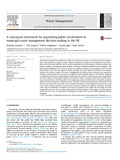JavaScript is disabled for your browser. Some features of this site may not work without it.
| dc.contributor.author | Garnett, Kenisha | |
| dc.contributor.author | Cooper, Tim | |
| dc.contributor.author | Longhurst, Philip J. | |
| dc.contributor.author | Jude, Simon | |
| dc.contributor.author | Tyrrel, Sean | |
| dc.date.accessioned | 2017-04-19T13:12:02Z | |
| dc.date.available | 2017-04-19T13:12:02Z | |
| dc.date.issued | 2017-04-13 | |
| dc.identifier.citation | Kenisha Garnett, Tim Cooper, Philip Longhurst, Simon Jude, Sean Tyrrel, A conceptual framework for negotiating public involvement in municipal waste management decision-making in the UK, Waste Management, Vol 66, August 2017, pp. 210-221 | en_UK |
| dc.identifier.issn | 0956-053X | |
| dc.identifier.uri | http://dx.doi.org/10.1016/j.wasman.2017.04.022 | |
| dc.identifier.uri | http://dspace.lib.cranfield.ac.uk/handle/1826/11782 | |
| dc.description.abstract | The technical expertise that politicians relied on in the past to produce cost-effective and environmentally sound solutions no longer provides sufficient justification to approve waste facilities. Local authorities need to find more effective ways to involve stakeholders and communities in decision-making since public acceptance of municipal waste facilities is integral to delivering effective waste strategies. This paper presents findings from a research project that explored attitudes towards greater levels of public involvement in UK waste management decision-making. The study addressed questions of perception, interests, the decision context, the means of engagement and the necessary resources and capacity for adopting a participatory decision process. Adopting a mixed methods approach, the research produced an empirical framework for negotiating the mode and level of public involvement in waste management decision-making. The framework captures and builds on theories of public involvement and the experiences of practitioners, and offers guidance for integrating analysis and deliberation with public groups in different waste management decision contexts. Principles in the framework operate on the premise that the decision about ‘more’ and ‘better’ forms of public involvement can be negotiated, based on the nature of the waste problem and wider social context of decision-making. The collection of opinions from the wide range of stakeholders involved in the study has produced new insights for the design of public engagement processes that are context-dependent and ‘fit-for-purpose’; these suggest a need for greater inclusivity in the case of contentious technologies and high levels of uncertainty regarding decision outcomes. | en_UK |
| dc.language.iso | en | en_UK |
| dc.publisher | Elsevier | en_UK |
| dc.rights | Attribution 4.0 International (CC BY 4.0) You are free to: Share — copy and redistribute the material in any medium or format, Adapt — remix, transform, and build upon the material for any purpose, even commercially. The licensor cannot revoke these freedoms as long as you follow the license terms. Under the following terms: Attribution — You must give appropriate credit, provide a link to the license, and indicate if changes were made. You may do so in any reasonable manner, but not in any way that suggests the licensor endorses you or your use. Information: No additional restrictions — You may not apply legal terms or technological measures that legally restrict others from doing anything the license permits. | |
| dc.subject | Public involvement | en_UK |
| dc.subject | Engagement | en_UK |
| dc.subject | Deliberation | en_UK |
| dc.subject | Municipal waste management | en_UK |
| dc.subject | Planning | en_UK |
| dc.title | A conceptual framework for negotiating public involvement in municipal waste management decision-making in the UK | en_UK |
| dc.type | Article | en_UK |
Files in this item
This item appears in the following Collection(s)
-
Staff publications (SWEE) [2827]
